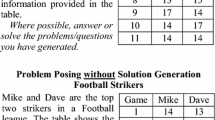Abstract
The present study assessed the effects of problem-solving (D'Zurilla & Goldfried, 1971) training on two problem-solving tasks. Sixty-one subjects were assigned randomly to and trained in one of the following groups: general orientation (GO)-problem definition (PD)-generation of alternatives (GA)-decision making (DM), GO-PD-GA, GO-PD-DM, GO-GA-DM, GO, and a control group. The six groups did not differ significantly at pretesting on the measures of selecting the best alternative solution and describing problem-solving behaviors used to solve problems. Training was significantly effective on selecting the best alternative solution for all groups compared with the control group at the time of posttesting. The GO-PD-GA-DM and GO-PD-DM groups described significantly more problem-solving behaviors than the GO-PD-GA, GO-GA-DM, and GO groups. All five treatment groups performed significantly better than the control group at the time of post-testing. At follow-up 1 month after posttesting, groups trained with the PD component selected significantly better alternatives than the groups without PD training. Groups trained with the DM component described significantly more problem-solving behaviors at follow-up than the groups trained without the DM component.
Similar content being viewed by others
References
Cormier, W. H., Cormier, L. S., Zerega, W. D., & Wagaman, G. L. (1976). Effects of learning modules on the acquisition of counseling strategies.Journal of Counseling Psychology, 23 136–141.
D'Zurilla, T. J., & Goldfried, M. R., (1971). Problem solving and behavior modification.Journal of Abnormal Psychology, 78 107–126.
D'Zurilla, T. J., & Nezu, A. (1980). A study of the generation-of-alternatives process in social problem solving.Cognitive Therapy and Research, 4 67–72.
Goldfried, M. R., & Davison, G. C. (1976).Clinical behavior therapy. New York: Holt, Rinehart & Winston.
Goldfried, M. R., & Goldfried, A. P. (1980). Cognitive change methods. In F. H. Kanfer & A. P. Goldstein (Eds.),Helping people change (2nd ed, pp. 97–130). New York: Pergamon Press.
Mahoney, M. J. (1974).Cognition and behavior modification. Cambridge, Ma: Ballinger.
Meichenbaum, D. H. (1977).Cognitive behavior modification. New York: Plenum Press.
Nezu, A., & D'Zurilla, T. J. (1979). An experimental evaluation of the decision-making process in social problem solving.Cognitive Therapy and Research, 3 269–277.
Nezu, A., & D'Zurilla, T. J. (1981a). Effects of problem definition and formulation on the generation of alternatives in the problem-solving process.Cognitive Therapy and Research, 5 265–271.
Nezu, A., & D'Zurilla, T. J. (1981b). Effects of problem definition and formulation on decision-making in the social problem-solving process.Behavior Therapy, 12 100–106.
Rudestam, K. E. (1980).Methods of self-change. Monterey, Ca: Brooks/Cole.
Author information
Authors and Affiliations
Rights and permissions
About this article
Cite this article
Cormier, W.H., Otani, A. & Cormier, L.S. The effects of problem-solving training on two problem-solving tasks. Cogn Ther Res 10, 95–108 (1986). https://doi.org/10.1007/BF01173386
Issue Date:
DOI: https://doi.org/10.1007/BF01173386




